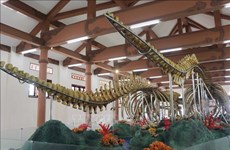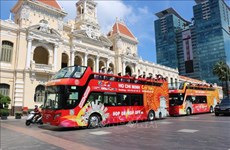Pristine beaches, reefs entice tourists
The heat in the country's large cities lures thousands of Vietnamese to
the beaches in the central region during their summer holidays.
The heat in the country's large cities lures thousands of Vietnamese to
the beaches in the central region during their summer holidays.
However, large crowds at well-known destinations, such as Nhat Le in Quang Binh and Nha Trang in Khanh Hoa, discourage local backpackers from visiting.
Instead, they enjoy visiting unspoiled beaches with white sands and blue waters where there are only a few people. Binh Ba island, which is located in Cam Ranh city's Cam Binh commune in the central province of Khanh Hoa, meets all their demands.
The island can only be reached by boats from Ba Ngoi port, which is about 15km from Cam Ranh airport.
Most of its residents raise lobsters for a living, and this is why it is also called "the Island of Lobsters". The seafood is included in a well-known saying on the specialties of Khanh Hoa people: Hon Noi bird's nests, Ninh Hoa's fetal duck eggs, Binh Ba lobsters, Dien Khanh's dried deer meat.
Nguyen Huong Giang from Hanoi was impressed by a wedding photo collection taken on Binh Ba and immediately booked flight tickets to see the beauty of the island in June.
As she had little time to prepare for the trip, the inhabitants of the island became her tour guides by outlining must-see places and interesting activities.
Her day began with walking along the pristine Chuong beach and watching the sunrise. After that, she and her friends drove their rented motorbikes to visit an old block house and a tunnel built during the French colonialisation, where they could enjoy another view of the sea.
In the afternoon, they greatly enjoyed swimming on Nom beach, and enjoyed eating seafood before going to Nha Cu beach to see the sunset. Like other tourists, they organised a small party on Chuong beach with special dishes cooked from lobsters, such as baked lobsters and lobster soups.
"The beaches here are very beautiful and clean, which is hard to find in other places. And people are very friendly and willing to help us. They tell us childhood stories and memories that make us become closer and more attached. I have not had any similar experience in other spots," Giang said.
Last year, Dang Duy Khanh from HCM City spent two days with his friends on the off-the-beaten-path island. A local tour guide took his group to Nha Cu beach to dive and view coral reefs, then visit lobster breeding grounds and have a barbecue on Chuong.
"Binh Ba has clean and beautiful beaches, as does Phu Quoc, but getting there is easier and staying there is much cheaper than in Phu Quoc. I've recommended Binh Ba to my friends and I'm planning to go back to the island this summer," Khanh said.
At the moment, there are about 700 households with 5,000 people living on the island. In recent years, it has seen an increasing number of tourists arriving on Binh Ba, as local residents develop tourism services and open restaurants, build hotels and conduct tours.
Islander Nguyen Ngoc Huy has raised lobsters for more than 10 years. One year ago, he opened a hotel to meet the growing demands of visitors. Developing tourism services is what many of the island citizen, such as Huy, participate in, along with their traditional fishing and lobster breeding jobs.
"In the past, only a few backpackers visited Binh Ba, then they went back and suggested it to their friends. Thanks to word of mouth, people know more about the island," Huy said.
"Binh Ba is currently not part of the tourism development plan of Khanh Hoa, so tourism development is spontaneous and unsupported by the authorities."
Although the tourism infrastructure and services on the island are meeting the demands of tourists, people there have begun to worry about the future, when the supply cannot meet the demands.
Huy said that Binh Ba's residents are seeking to increase the public's awareness in protecting the environment on the island and develop ways to keep it clean.
"If the number of visitors keeps going up, it will deteriorate within the next five to 10 years."-VNA
However, large crowds at well-known destinations, such as Nhat Le in Quang Binh and Nha Trang in Khanh Hoa, discourage local backpackers from visiting.
Instead, they enjoy visiting unspoiled beaches with white sands and blue waters where there are only a few people. Binh Ba island, which is located in Cam Ranh city's Cam Binh commune in the central province of Khanh Hoa, meets all their demands.
The island can only be reached by boats from Ba Ngoi port, which is about 15km from Cam Ranh airport.
Most of its residents raise lobsters for a living, and this is why it is also called "the Island of Lobsters". The seafood is included in a well-known saying on the specialties of Khanh Hoa people: Hon Noi bird's nests, Ninh Hoa's fetal duck eggs, Binh Ba lobsters, Dien Khanh's dried deer meat.
Nguyen Huong Giang from Hanoi was impressed by a wedding photo collection taken on Binh Ba and immediately booked flight tickets to see the beauty of the island in June.
As she had little time to prepare for the trip, the inhabitants of the island became her tour guides by outlining must-see places and interesting activities.
Her day began with walking along the pristine Chuong beach and watching the sunrise. After that, she and her friends drove their rented motorbikes to visit an old block house and a tunnel built during the French colonialisation, where they could enjoy another view of the sea.
In the afternoon, they greatly enjoyed swimming on Nom beach, and enjoyed eating seafood before going to Nha Cu beach to see the sunset. Like other tourists, they organised a small party on Chuong beach with special dishes cooked from lobsters, such as baked lobsters and lobster soups.
"The beaches here are very beautiful and clean, which is hard to find in other places. And people are very friendly and willing to help us. They tell us childhood stories and memories that make us become closer and more attached. I have not had any similar experience in other spots," Giang said.
Last year, Dang Duy Khanh from HCM City spent two days with his friends on the off-the-beaten-path island. A local tour guide took his group to Nha Cu beach to dive and view coral reefs, then visit lobster breeding grounds and have a barbecue on Chuong.
"Binh Ba has clean and beautiful beaches, as does Phu Quoc, but getting there is easier and staying there is much cheaper than in Phu Quoc. I've recommended Binh Ba to my friends and I'm planning to go back to the island this summer," Khanh said.
At the moment, there are about 700 households with 5,000 people living on the island. In recent years, it has seen an increasing number of tourists arriving on Binh Ba, as local residents develop tourism services and open restaurants, build hotels and conduct tours.
Islander Nguyen Ngoc Huy has raised lobsters for more than 10 years. One year ago, he opened a hotel to meet the growing demands of visitors. Developing tourism services is what many of the island citizen, such as Huy, participate in, along with their traditional fishing and lobster breeding jobs.
"In the past, only a few backpackers visited Binh Ba, then they went back and suggested it to their friends. Thanks to word of mouth, people know more about the island," Huy said.
"Binh Ba is currently not part of the tourism development plan of Khanh Hoa, so tourism development is spontaneous and unsupported by the authorities."
Although the tourism infrastructure and services on the island are meeting the demands of tourists, people there have begun to worry about the future, when the supply cannot meet the demands.
Huy said that Binh Ba's residents are seeking to increase the public's awareness in protecting the environment on the island and develop ways to keep it clean.
"If the number of visitors keeps going up, it will deteriorate within the next five to 10 years."-VNA











